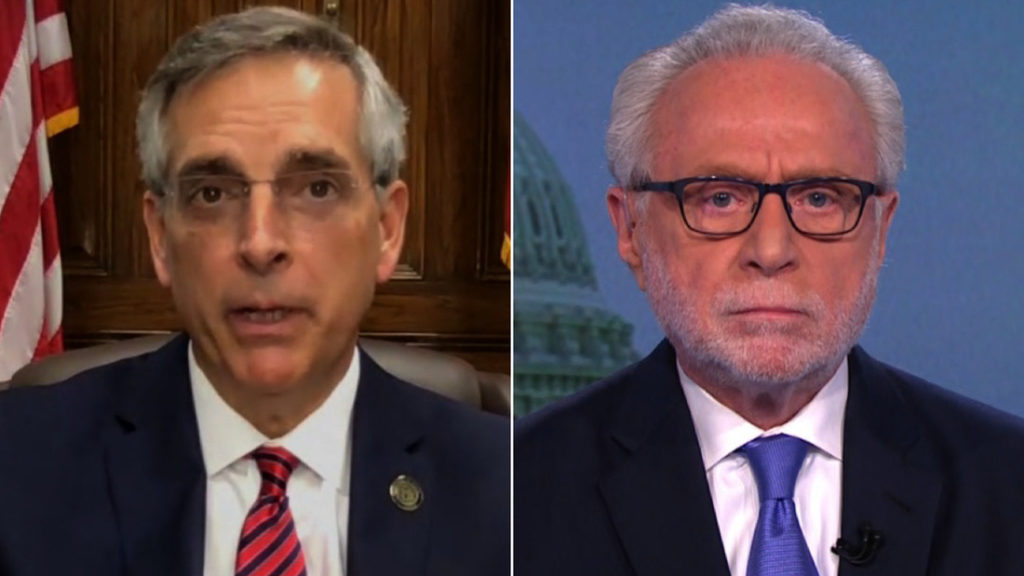
“He asked if the ballots could be matched back to the voters,” Raffensperger told CNN’s Wolf Blitzer on “The Situation Room” Monday evening. “And then he, I got the sense it implied that then you could throw those out for any, if you look at the counties with the highest frequent error of signatures. So that’s the impression that I got.”
He later added, “It was just an implication of, ‘Look hard and see how many ballots you could throw out.’ ”
Graham, a South Carolina Republican who is chairman of the Senate Judiciary Committee, also inquired if Raffensperger could discard all mail-in ballots from counties that had shown higher rates of unmatched signatures, the Republican secretary of state told the Post on Monday.
Graham denied Raffensperger’s claim on Monday, telling CNN that he had said he wanted to understand the process for verifying the signatures on mail-in ballots. He said President Donald Trump did not urge him to make the call.
Asked if he was trying to pressure the secretary of state to toss legal ballots, Graham said, “That’s ridiculous.”
“What I’m trying to find out was how do you verify signatures on mail-in ballots in these states that are the center of attention? So like when you mail in a ballot, you got to have some way to verify that the signature on the envelope actually matches the person who requested the ballot,” Graham said. “It seems to me that Georgia has some protections that maybe other states don’t have, where you go into the portal to get your ballot. But I thought it was a good conversation. I’m surprised to hear him verify it that way.”
Graham added: “So they expanded mail-in voting, and how you verify the signatures to me is the big issue. If you’re going to have mail-in voting, you’ve got to verify that the person who signed the envelope is also the person who requested the ballot.”
On Tuesday, Graham defended his outreach to officials in Arizona, Nevada and Georgia as an attempt to learn about how these states validate signatures on mailed-in ballots, arguing it was part of his effort to determine whether any changes need to be made — even though Trump is projected to lose all three states and has made unsubstantiated claims of mass voting fraud.
“If we’re going to expand voting by mail, which we probably will, I want to make sure that we’re taking the precautions necessary to validate signatures like we do if you show up on Election Day,” he told CNN.
Raffensperger told Blitzer that Georgia’s election systems already require signature matches when voters request mail ballots and when completed ballots are returned to election systems. He also said the online absentee portal has a photo ID.
“We feel confident the election officials did their job,” he said.
Experts say it would be nearly impossible for Trump to overcome his 14,000-vote deficit in a recount.
The audit process is expected to conclude in the coming days, and Raffensperger reiterated Monday that he plans to certify the official results by Friday, as required by state law.
“We want to make sure this vote is very accurate. We understand the national importance of this, and we’re in the process of doing it,” he told Blitzer on Monday. “The counters will be done by the 18th and we will certify this by the 20th.”
The Republican spent part of his Sunday fact-checking Trump and pushing back against false claims of fraud in the presidential election and the hand recount ongoing in the state.
Raffensperger, among other things, defended the integrity of absentee ballots, signature verification, and the vote counting machines. He posted images of Trump’s tweets that falsely claimed that mail-in voting “will lead to the most corrupt election in USA history” and result in “fraudulent ballots.” Raffensperger responded that his team “secured and strengthened absentee ballots for the first time since 2005” by outlawing absentee ballot harvesting and also addressed the “disinformation about signature match,” writing that “GBI trained elections officials match your signature twice before any vote is cast.”
He also posted links to news articles debunking Trump’s tweets, including one alleging the Dominion voting software used in Georgia for the presidential election “deleted” and “switched” millions of votes. He also wrote, “Dominion voting system. America owned. America. ‘Merica. Not Venezuela,” in a reference to conspiracy theories spread by Trump’s lawyer, Rudy Guiliani.
Underscoring the contentious atmosphere between Raffensperger and fellow Republicans, he went after US Rep. Doug Collins, a Georgia Republican, in one post writing, “Failed candidate Doug Collins is a liar — but what’s new?” Collins is leading the recount team for Trump in Georgia and has criticized Raffensperger’s handling of the election.
This story has been updated with additional developments Tuesday.
CNN’s Amara Walker and Jason Morris contributed to this report.
You may also like
-
UK coronavirus variant has been reported in 86 countries, WHO says
-
NASA technology can help save whale sharks says Australian marine biologist and ECOCEAN founder, Brad Norman
-
California Twentynine Palms: Explosives are missing from the nation’s largest Marine Corps base and an investigation is underway
-
Trump unhappy with his impeachment attorney’s performance, sources say
-
Lunar New Year 2021: Ushering in the Year of the Ox

